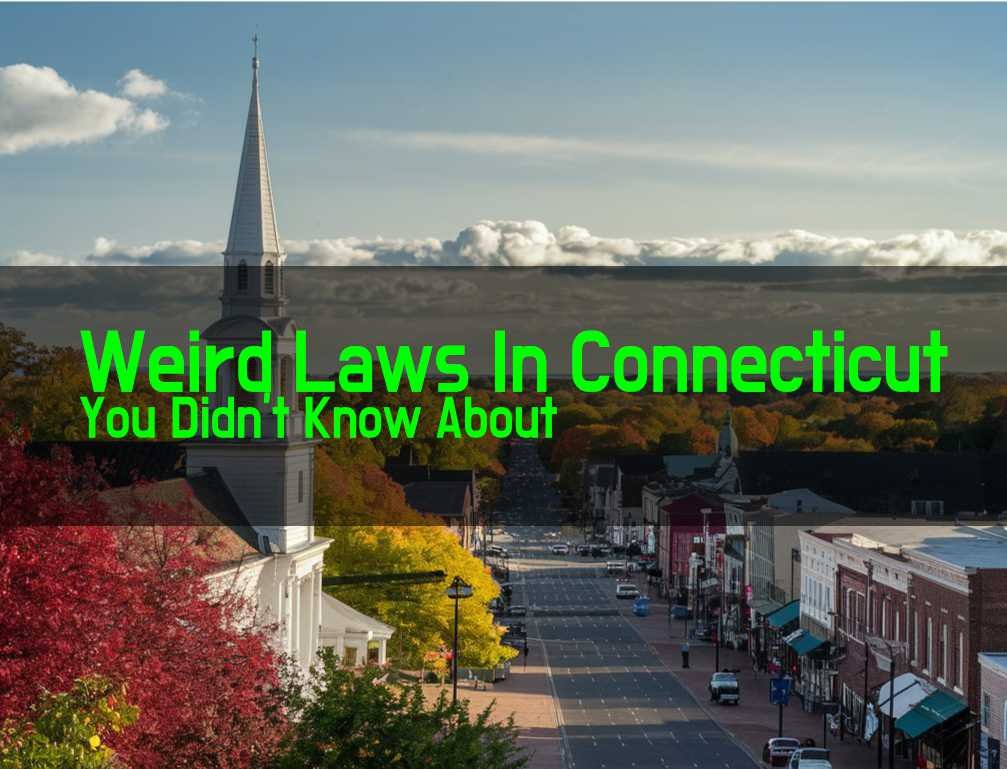Here are some of Connecticut’s goofiest and weirdest laws till date!
1. Keeping Town Records Away From The Booze
Town records may not be kept where liquor is sold. This law likely stems from a time when saloons were seen as places of potential corruption or rowdiness. Keeping official documents away from establishments serving alcohol aimed to prevent them from being tampered with or lost in a chaotic environment.
2. Speed Demons on Two Wheels?
You can be stopped by the police for biking over 65 miles per hour. This law might seem strange, but it highlights that bicycles are considered vehicles under Connecticut law. Having a speed limit for bikes ensures safety on roadways shared by cars and cyclists.
3. The Great Pickle Bounce Debate (Myth!)
In order for a pickle to officially be considered a pickle, it must bounce. This is a widely circulated myth! There is no actual law requiring pickles to bounce. It’s possible the confusion arose from historical regulations on food quality, ensuring proper pickling processes.
4. Disposing of Razor Blades Safely

It is illegal to dispose of used razor blades. This law is in place for safety reasons. Razor blades are considered sharp waste and can cause injuries to sanitation workers if not disposed of properly.
5. Connecticut’s Alcohol Restrictions
You cannot buy any alcohol after 9 pm or on Sundays after noon on Sunday. These restrictions are part of Connecticut’s liquor control laws aimed at regulating alcohol sales and consumption.
6. Firearms and Public Safety
It is illegal to discharge a firearm from a public highway. This law makes perfect sense, preventing accidental shootings and ensuring public safety.
7. Devon’s Backward Walkers Beware (Repealed!)
In Devon – It is unlawful to walk backwards after sunset. This ordinance, while peculiar, may have been intended to prevent pedestrians from creating hazards for themselves and drivers at night. It’s important to note that this law has likely been repealed, as such ordinances are rarely enforced.
8. Keeping Christmas Decorations Traditional (Repealed!)
In Guilford – Only white Christmas lights are allowed for display. Similar to the Devon walking law, this ordinance likely aimed to maintain a certain aesthetic during the holidays. It’s also likely been repealed, with most towns allowing for a wider variety of Christmas lights.
9. Keeping Hartford’s Streets Safe (and Upright)
In Hartford – You aren’t allowed to cross a street while walking on your hands. This law, while seemingly silly, prohibits pedestrians from engaging in activities that could distract them from traffic and lead to accidents.
10. Dog Education Ban (Uncertain Status)
In Hartford – You may not educate dogs. The origin and purpose of this law are unclear. It might be outdated or pertain to a specific type of dog training deemed unethical.
11. Keeping Sundays Holy (Repealed!)
In Hartford – It is illegal for a man to kiss his wife on Sunday. This outdated law likely reflects old religious restrictions on certain activities on Sundays.
12. Speeding Fire Trucks? Not in New Britain!
In New Britian – It is illegal for fire trucks to exceed 25mph, even when going to a fire. This law prioritizes safety, aiming to prevent accidents involving speeding fire trucks.
13. Limiting Arcade Fun in Rocky Hill
In Rocky Hill – An arcade may not have more than a total of four amusement devices such as ping-pong tables, pinball machines, or shuffleboard tables. This law might be related to zoning restrictions or a desire to limit the size and impact of arcades in the area.
14. Southington Says No to Silly String
In Southington – Silly string is banned. This law likely exists due to concerns about the potential misuse of silly string, such as creating a mess or causing a safety hazard.
15. Keeping it Quiet During Your Waterbury Haircut
In Waterbury – It is illegal for any beautician to hum, whistle, or sing while working on a customer. This law might be intended to ensure a relaxing and professional atmosphere in salons. However, it’s likely not strictly enforced.
16. No Matches for Minors (Repealed!)
In the past, it was illegal to sell matches to anyone under 16. This law aimed to prevent fires caused by children playing with matches. With the invention of safer lighters and a decline in match use, this law is likely no longer enforced.
17. Curious Cow Regulations
Across Connecticut, there are various laws regarding cows. One such law states that cows must be outfitted with bells while walking on public roads. Another prohibits dairy farms from using names that mislead consumers about the origin of their milk.
18. Sleeping in Graveyards? Not Recommended (But Not Illegal)
An interesting quirk in Connecticut law is that there is no specific law against sleeping in a graveyard. While it might not be the most respectful behavior, it technically isn’t illegal.
19. Balloons with a Message, Not in Hartford
In Hartford, balloons with advertising messages are strictly prohibited. This law likely aims to control visual clutter and maintain a certain aesthetic in the city.
20. No Sunday Car Meals in Bloomfield
Bloomfield has a law on the books that makes it illegal to eat in your car on Sundays. The reasoning behind this law is unclear, but it might be related to religious restrictions on commerce or leisure activities on Sundays.
21. Public Displays of Discontent (Repealed?)
In Litchfield, an old ordinance reportedly prohibited people from frowning in public. This law was likely intended to promote a sense of community cheer, but it’s doubtful it was ever seriously enforced.
22. Whistling Women? Not in New London (Repealed!)
An old law in New London supposedly prohibited women from whistling in public. This law likely stemmed from outdated gender norms, and it’s safe to assume it’s no longer on the books.
23. Can’t Catch a Ride on a Moose (Everywhere!)
This isn’t specific to Connecticut, but it’s worth mentioning. It’s illegal to ride a moose on a public highway anywhere in the state!
24. Public Intoxication…of Squirrels? (Uncertain Status)
An obscure law in Stamford prohibits the public intoxication of squirrels. The origin and purpose of this law are unclear. It might be a satirical ordinance or a relic from a bygone era with a more literal interpretation of “public intoxication.”
25. Don’t Forget Your License…to Play Mini Golf (Repealed!)
In the past, certain towns in Connecticut required a license to operate a mini golf course. This might seem like an unnecessary hurdle, but it highlights the potential for local regulations to impact even seemingly harmless activities.
26. Dressing Up as a Christmas Tree? Not in Fairfield (Repealed!)
Fairfield once had a law prohibiting people from dressing up as Christmas trees and walking around town. This unusual ordinance might have been intended to maintain order during holiday celebrations.
27. A Limit on Live Poultry (Uncertain Status)
Some Connecticut towns have laws restricting the number of live chickens or other poultry residents can keep on their property. This regulation likely aims to balance animal welfare concerns with maintaining a peaceful residential environment.
28. Fireworks Fussy (Varies by Town)
While some Connecticut towns allow fireworks displays with permits, others have stricter regulations or outright bans. This variation highlights the power of local governments to set their own rules regarding fireworks.
29. The Great Pickle Debate Continues (Sort Of)
While the “bouncing pickle” law is a myth, there may have been historical regulations around pickle quality control. Additionally, some pickle producers take pride in the crispness of their pickles, which could be misconstrued as a “bounce.”
30. Antiques and Oddities (Varies by Town)
Some Connecticut towns have ordinances regulating the sale of antiques and oddities. These might be aimed at preventing the sale of stolen goods or ensuring the authenticity of historical items.
31. Yard Sale Shenanigans (Varies by Town)
Several towns have restrictions on the frequency and duration of yard sales. This could be to prevent neighborhoods from being overrun by temporary vendors or to maintain a certain aesthetic on residential streets.
32. Keeping Up Appearances (Varies by Town)
Some towns have ordinances regarding lawn care and property maintenance. These might specify acceptable grass height, regulations on unsightly structures like sheds, or limitations on the number of parked cars on residential property.
33. Leash Laws and Beyond (Varies by Town)
While leash laws for dogs are common nationwide, some Connecticut towns have additional regulations regarding pet behavior and waste disposal. These might include restrictions on off-leash areas or specific rules for cleaning up after your pet.
34. Keeping Noise Down (Varies by Town)
Many towns have noise ordinances that limit the level of noise allowed during certain times of day. This could be to ensure peace and quiet for residents, especially in areas with a mix of residential and commercial properties.
35. Signs, Signs Everywhere (Varies by Town)
Towns often have regulations regarding the size, placement, and content of signs on private property. This could be for aesthetic reasons or to prevent visual clutter that could distract drivers or detract from the overall character of a neighborhood.
36. Freaky Food Laws (Varies by Town)
Some Connecticut towns have ordinances related to specific food items. One example might be limitations on the sale of certain types of street food, while another could be regulations on the operation of mobile food trucks.
37. Keeping Sunday Special (Varies by Town & Repealed in Many Cases)
While some of Connecticut’s Sunday restrictions might be repealed statewide, some towns may still have ordinances in place limiting certain activities on Sundays. These could range from restrictions on retail sales to limitations on construction work.
38. The Great Parking Debate (Varies by Town)
Parking regulations can vary greatly between Connecticut towns. Some might have stricter enforcement of time limits or permit requirements, while others might have designated areas for resident parking only.
39. Keeping Sidewalks Clear (Varies by Town)
Towns often have ordinances requiring property owners to clear their sidewalks of snow and ice. These regulations can vary depending on the specific town and the severity of the snowfall.
40. Keeping it Clean (Varies by Town)
Many towns have ordinances related to littering and waste disposal. These might specify acceptable methods for disposing of yard waste, bulky items, or hazardous materials.
41. Architectural Quirks (Varies by Town)
Some Connecticut towns have historic preservation districts with regulations regarding the renovation or modification of buildings with historical significance. These ordinances aim to maintain the architectural character of these areas.
42. Keeping it Local (Varies by Town)
Towns often have ordinances that promote local businesses or initiatives. These could include restrictions on chain stores or regulations encouraging the use of local farmers markets.
43. Animal Encounters (Varies by Town)
While some regulations might be statewide, towns can have additional ordinances regarding specific animals. This could include restrictions on feeding wildlife or limitations on the types of pets allowed within town limits.
44. Special Events and Permits (Varies by Town)
Towns often require permits for special events like block parties or parades. These regulations aim to ensure the safety and order of such events.
45. Private Property, Public View (Varies by Town)
Some towns have ordinances regarding the use of private property that might be visible from public spaces. This could include limitations on the placement of signs or restrictions on certain types of landscaping.

Leave a Reply